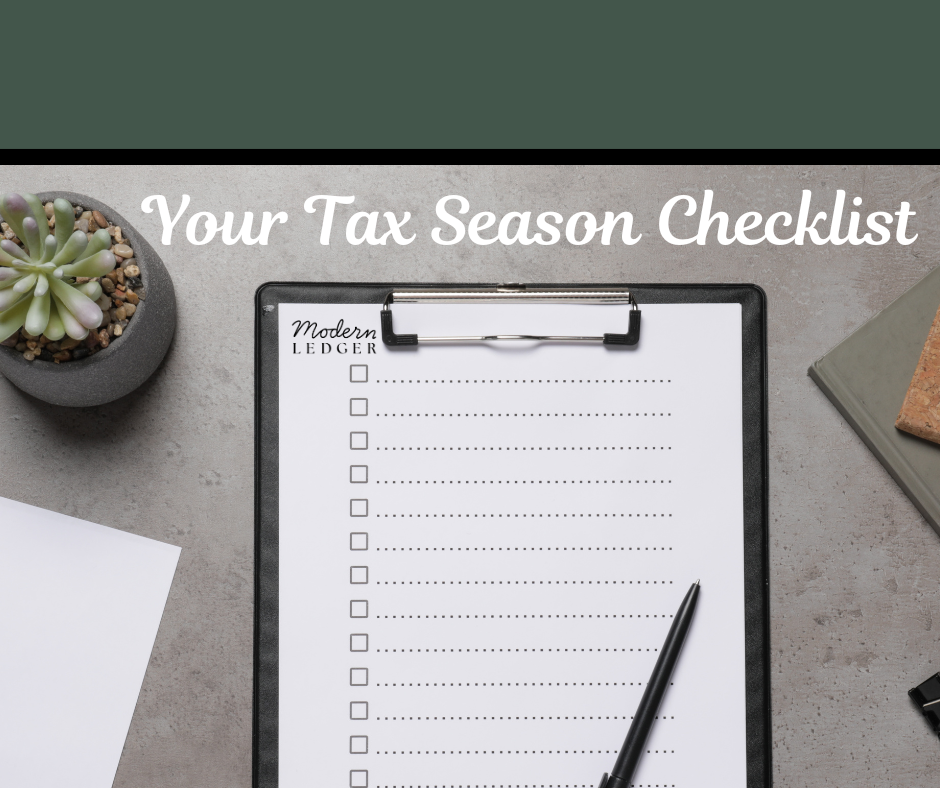Your Tax Season Checklist: Everything You Need to File with Confidence

Your Tax Season Checklist
Tax season can feel overwhelming, but a little preparation can go a long way. Whether you’re an individual, freelancer, or business owner, knowing what documents you need before you file can help make tax time smoother—and maybe even get you a bigger refund! To keep things simple, we’ve broken this checklist into categories:
Income
The money you made (because the IRS wants to know about all of it).
Expenses & Deductions
Things that could lower your taxable income.
Filing Status
What you need based on whether you’re filing as an individual or a business.
So grab a cup of coffee (or tea!) and let’s go through your tax season checklist together.
Income: What You Need to Report
No matter how you earn money, the IRS wants to know about it. So be sure to gather all your income documents before filing.
If You’re an Individual or Employee
W-2 Forms
If you worked a regular job, your employer will send you this by January 31.
1099-NEC
If you did freelance, contract, or gig work, clients must send this if they paid you $600 or more.
1099-K
If you received over $20,000 and 200+ transactions via PayPal, Venmo, or third-party platforms.
1099-G
If you received unemployment benefits.
1099-INT or 1099-DIV
If you earned interest from a bank account or dividends from investments.
Social Security Benefits (SSA-1099)
If you received Social Security income.
Retirement Income (1099-R)
If you took money from an IRA, 401(k), or pension. Even if you didn’t receive a tax form for a side hustle or cash payments, you’re still required to report that income! Keep your own records to avoid issues.
If You’re a Business Owner or Self-Employed
Business Income Records
This includes sales, invoices, PayPal/Venmo transactions, and client payments.
Rental Income
If you rent property, report what you earned (Form 1099-MISC if applicable).
Stock or Cryptocurrency Sales (1099-B)
If you traded stocks or crypto, your brokerage will send this form.
Partnership or S-Corp Income (Schedule K-1)
If you’re part of a partnership or S-corporation. If you didn’t get a 1099-NEC or 1099-K but still made money, you still need to report it. Keep your own income records throughout the year to avoid surprises.
Expenses & Deductions: What Can Lower Your Taxes
Deductions reduce your taxable income, meaning you owe less or get a bigger refund.
If You’re an Individual or Employee
Student Loan Interest (1098-E)
If you paid student loan interest, you may be able to deduct it.
Mortgage Interest (1098)
Homeowners, this form helps reduce your taxable income.
Property Taxes
If you paid property taxes, keep those records.
Charitable Donations
If you donated to a qualified charity, keep receipts for tax deductions.
Medical Expenses
If your medical expenses exceeded 7.5% of your income, you may be able to deduct them.
Childcare Costs
If you paid for daycare or after-school care, you may qualify for a Child and Dependent Care Credit.
Education Expenses (1098-T)
If you paid for college, you may qualify for education tax credits.
If You’re a Business Owner or Self-Employed
Home Office Deduction
If you use a dedicated workspace for business, you may be able to deduct a portion of your rent, utilities, and internet.
Vehicle & Mileage Expenses
If you use a car for business, track mileage, gas, and maintenance costs.
Office Supplies & Equipment
Keep receipts for computers, printers, software, and office furniture.
Advertising & Marketing Costs
This includes website hosting, social media ads, and business cards.
Business Meals & Travel
If you traveled for work or had business meals, keep those receipts and note who you had the business meeting with right on the receipt.
Health Insurance Premiums
If you’re self-employed and pay for your own health insurance, this might be deductible.
Retirement Contributions
If you contribute to a SEP IRA, Solo 401(k), or SIMPLE IRA, you may get tax savings.
Tip:
Use accounting software like QuickBooks or Wave to track expenses year-round. This makes tax time much easier!
Filing Status & Important Deadlines
Make sure you choose the right filing status and mark these key tax dates on your calendar.
Filing Status Options (For Individuals)
Single
If you’re unmarried or legally separated.
Married Filing Jointly
Most couples save more by filing together.
Married Filing Separately
May be beneficial if one spouse has large deductions or student loans.
Head of Household
If you’re unmarried but support a dependent, you may qualify for a larger standard deduction.
.
Tip:
If you had a major life change (marriage, divorce, new child, etc.), check which filing status is best for you.
Important Tax Deadlines
January 31:
Employers & clients must send W-2s & 1099s.
April 15:
Tax Day! File or request an extension.
October 15 :
Extended deadline (if you filed for an extension).
Tip:
Even if you file for an extension, any taxes owed are still due by April 15. If you need more time, set up an IRS payment plan to avoid penalties.
A Little Preparation Goes a Long Way!
We know tax season isn’t fun, but being prepared can make it so much easier. By organizing your income, deductions, and documents now, you’ll be ready to file quickly, accurately, and with less stress.
Your Tax Season To-Do List:
- Gather all your income documents (W-2s, 1099s, etc.).
- Track deductions & expenses to lower your tax bill.
- Choose the right filing status for your situation.
- Mark important tax deadlines on your calendar.
- File early to avoid last-minute stress!
